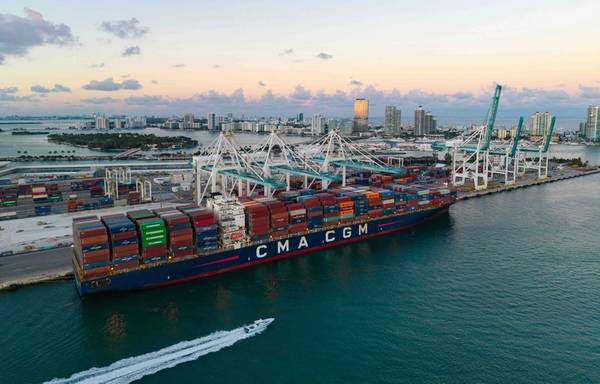
Vessels owned or operated by U.S. firms and individuals, or those built in the United States or that fly the U.S. flag, will be charged additional port fees per voyage starting on Tuesday, China's transport ministry said.
The fees are a countermeasure against upcoming U.S. port fees on Chinese ships, the ministry said on Friday.
Also starting on October 14, ships built in China - or operated or owned by Chinese entities - will need to pay a fee at their first port of call in the United States. Fees could top $1 million for a ship carrying more than 10,000 containers, and could rise annually through 2028, according to analyst estimates.
Vessels owned or operated by a Chinese entity will face a flat fee of $80 per net tonnage per voyage to the U.S.
CHINA CALLS U.S. FEES DISCRIMINATORY
The U.S. fees on China-linked vessels, following a probe by the U.S. Trade Representative, are part of a broader U.S. effort to revive domestic shipbuilding and blunt China's naval and commercial shipping power.
"It is clearly discriminatory and severely damages the legitimate interests of China's shipping industry, seriously disrupts the stability of the global supply chain, and seriously undermines the international economic and trade order," the Chinese ministry said.
Over the past two decades, China has catapulted itself to the No. 1 position in the shipbuilding world, with its biggest shipyards handling both commercial and military projects.
The Chinese fees on U.S. vessels could hurt the U.S. less than the U.S. fees might harm the legion of Chinese ships.
The fees announced by China, like those put in place by the U.S., "add further complexity and cost to the global network that keeps goods moving and economies connected, and risk harming their exporters, producers, and consumers at a time when global trade is already under pressure," said Joe Kramek, president and CEO of the World Shipping Association.
Last year, Chinese shipyards built more than 1,000 commercial vessels, while the U.S. constructed fewer than 10, according to military and industry analysts.
RATES RISE OVER THREE YEARS
For U.S. vessels berthing at Chinese ports from October 14, the rate will be 400 yuan ($56.13) per net tonne, the Chinese transport ministry said.
That will increase to 640 yuan ($89.81) from April 17, 2026, and to 880 yuan ($123.52) from April 17, 2027.
For vessels calling at Chinese ports from April 17, 2028, the charge will be 1,120 yuan ($157.16) per net tonne.
Tensions between China and the United States have started to deepen since September, with the two superpowers looking to be struggling to move beyond their current trade tariff truce - a 90-day pause from August 11 that ends around November 9.
Retaliatory tariffs in the U.S.-China trade war this year have sharply curtailed Chinese imports of U.S. agriculture and energy products.
"There is not much impact likely on agriculture trade, but this step goes to show that China is still irritated with U.S. and they are not going to allow U.S. agricultural imports anytime soon," said one oilseed trader at an international company, which sells soybeans to China.
"You don't take such steps if you're trying to resolve matters. Chinese crushers might have to do without U.S. beans this year."
U.S. President Donald Trump and Chinese leader Xi Jinping are expected to meet as they attend Asia-Pacific Economic Cooperation (APEC) meetings in South Korea at the end of this month.
($1 = 7.1241 Chinese yuan renminbi)
(Reuters)


